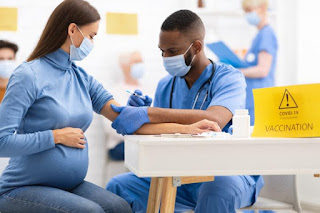Pregnancy, Breastfeeding and Covid Vaccine
As a midwife, and a community midwife at that, I feel I have a responsibility to mention and discuss the Covid-19 vaccination programme with women that come to me, but also with the public to ensure that women can make an informed choice in regards to their health and their unborn babies. Admittedly, there has been mixed messages about the population I look after having the vaccination, however the message is now clear.
There is no evidence that the vaccines have any effect on fertility or your chances of becoming pregnant. They offer pregnant women the best protection against Covid 19, which can be a serious illness. All women should now be having the Covid-19 vaccine, regardless of whether they are pregnant or breastfeeding, in line with their age group callout.
Pregnant women are more likely to be seriously unwell with Covid-19. If women do contract Covid-19, there is an increased risk of stillbirth and premature delivery. Often the latter is required to allow the mother to receive adequate life-saving treatment.
With this week's relaxation of restrictions, I'm personally even more worried that we will have an even bigger increase in infections among pregnant women. I can't even begin to explain how many we have already have. This is worrying, not only because women are getting sick, but also because it puts increase pressure on the workforce.
At present, 58% of women have declined the vaccine. The main reasons being because they were worried that it would harm the baby or because they were waiting on more information about the safety. The vaccines available in the UK have been shown to be effective and to have a good safety profile, based on robust data from the US, where around 120,000 pregnant women have been vaccinated. From this, it was shown that there was no increased risk of miscarriages or mortality, yet the same protection was offered. Plus, they have the additional bonus of antibodies being past to the unborn. These vaccines also do not contain live virus and cannot infect a pregnant woman or her unborn baby in the womb.
The majority of the population of childbearing age are now under 40. This age group is advised to have the Pfizer-BioNTech or Moderna mRNA vaccines already, however due to the slightly increased risk of blood clots with the AstraZeneca vaccine, plus that of pregnancy, it's also recommended to have the former choice.
Like all medicines, vaccines can cause common side effects. The side effects associated with the vaccine, are the same as that across the entire population. They do not worsen in pregnancy. However, because of this, I personally do not recommend women have the vaccine at after 36 weeks of pregnancy, purely for the simple fact that labour is already difficult enough, without feeling the side effects on top of that.
Regardless on the vaccination status, no vaccine is 100% effective so it is important to continue to protect yourself and your family. Still practise social distancing, wear a face mask, wash your hands frequently, open windows and remember to take twice weekly lateral flow tests.
I know so many women who have decided to have it, and so many who have decided to wait. Whatever you decision, I'm interested to hear your experience. One story shared locally shows how a healthcare worker had her first just after she found out she was pregnant. You can find more details through reading the full Royal College of Obstetricians and Gynaecologists guidance or the government information.


Comments
Post a Comment